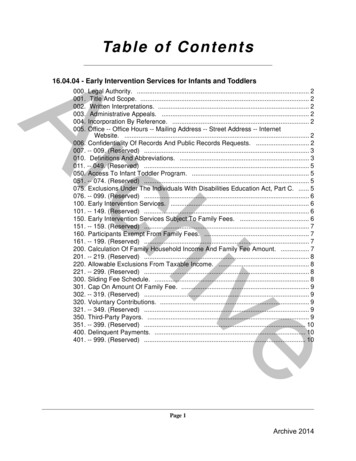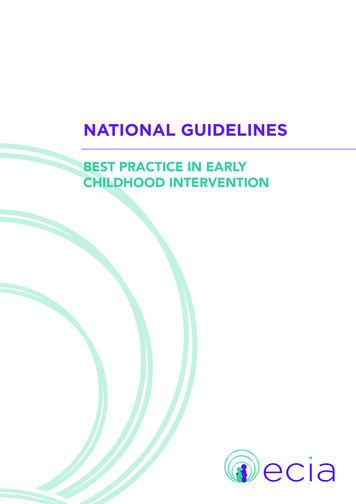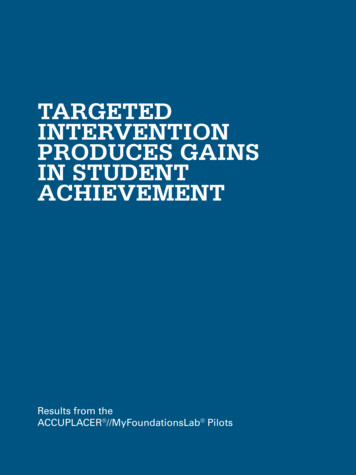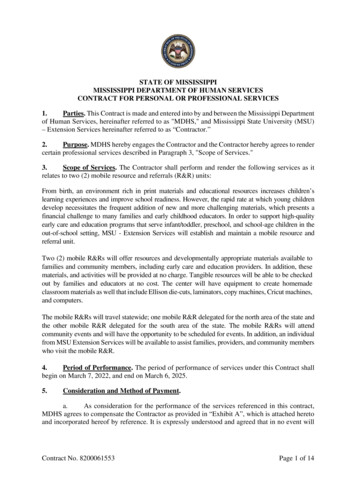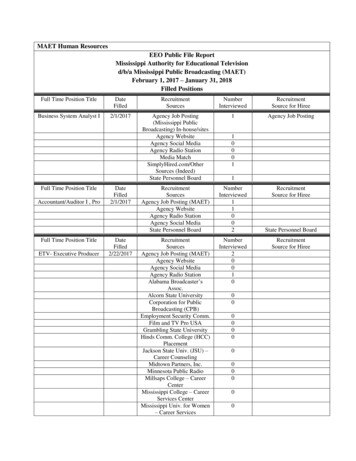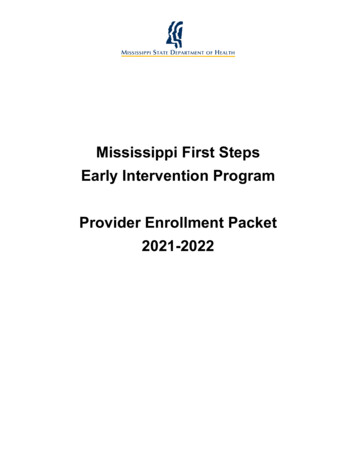
Transcription
Mississippi First StepsEarly Intervention ProgramProvider Enrollment Packet2021-2022
Table of ContentsVision, Mission, and Principles and ValuesVision StatementMission StatementPrinciples and Values Statements1Mississippi First Steps Early Intervention Program (MSFSEIP) OverviewOrganizationMississippi State Interagency Coordinating Council (MSICC)2Regulations, Policies, and ProceduresFederal RegulationsState Policies and ProceduresEvidence-Informed PracticesFamily RightsFamily Engagement3Provider Requirements and Enrollment ProcessProvider Licensure/CertificationEarly Intervention Personnel StandardsTraining and Technical AssistanceProvider Enrollment Process9Service Provision, Documentation, and BillingReferrals for ServicesService ProvisionMITI Data SystemDocumentation of Services ProvidedBilling for Services ProvidedTraining and Access to the MITI Data System15ContactsState Early Intervention ProgramRegional Early Intervention Programs17APPENDIXProvider Enrollment FormRequired Organization InformationRequired Service Provider information
VISIONMississippi’s children with special needs, under three years of age, and theirfamilies will grow, develop, learn, and actively participate in their homes andcommunities throughout their lives.MISSIONThe Mississippi First Steps Early Intervention Program provides high-quality,family-centered developmental supports and services to families and caregiversto enhance their child’s development through early learning opportunitiesembedded in their daily routines and activities.Principles and Values Statements1.2.3.4.5.6.7.8.9.10.Early identification, early services and supports, and family involvement arecritical for optimal development of young children. The earlier supports andservices begin, the better the developmental outcomes for the infant or toddlerand the family.Infants and toddlers learn best through enriched environments, everydayexperiences, and interactions with familiar people in familiar contexts.The early intervention process, from referral through transition, must be dynamicand individualized to honor and respect each family’s preferences for their childand family, learning styles, and cultural beliefs.All families, with the necessary supports and resources, can enhance their child’searly learning and development.The family’s concerns, priorities, and resources are addressed moreappropriately by a primary service provider who represents and receives teamand community support.The primary role of service providers and coordinators in the early interventionprocess is to work with and support family members and caregivers in makinginformed decisions about their children’s lives.The Individualized Family Service Plan (IFSP) outcomes must be functional,based on high-quality standards, and meet family-identified priorities based onthe child’s and family’s needs.Interventions with young children and family members must be based on explicitprinciples, the best available research, validated practices, and relevant laws andregulations.Children are most likely to attain their goals when families actively participate inservice provision and consistently incorporate interventions into their dailyroutines and activities.Transition is a process of transforming relationships and responsibilities. ServiceCoordinators work collaboratively with other agencies and program staff toensure a smooth and effective process.Mississippi State Department of HealthPage 1 of 17Provider Enrollment PacketMississippi First Steps Early Intervention Program
Mississippi First Steps Early Intervention Program (MSFSEIP) OverviewThe Mississippi First Steps Early Intervention Program (MSFSEIP) is responsible foroverseeing the provision of early intervention services to infants and toddlers withdisabilities and their families according to Part C of the Individuals with DisabilitiesEducation Act in Mississippi. The Mississippi State Department of Health is the LeadAgency in this interagency effort.Mississippi’s 82 counties are organizedinto three public health regions, each ofwhich operates three Local EarlyIntervention Programs (LEIP), for a totalof nine LEIPs. Each LEIP is responsiblefor ensuring all eligible infants andtoddlers and their families are connectedto early intervention services in theircommunity to promote child and familyoutcomes.The State EIP establishes programpolicies and procedures, reports data tothe Department of Education, providesgeneral supervision and technicalassistance to each of the LEIPs, andprovides opportunities for professionaldevelopment for early interventionproviders across the state.Regional and LEIP ContactsAreaRegion 1LEIP 1LEIP 2LEIP 3Region 2LEIP 4LEIP 5LEIP 6Region 3LEIP 7LEIP 8LEIP 9NameMelissa CoxQuena MillsTamiela RamseyMichele MastersonClaudia SheddTonia Wilson-WarnerPaulita Edwards-ChildsLaSondra McIntyreJimmie McCartyAnissa PaceApril SorelLisa BondsStephenie BaileyGina SmithMississippi State Department of .ms.govGina.Smith@msdh.ms.govPage 2 of 17Provider Enrollment PacketMississippi First Steps Early Intervention Program
Mississippi State Interagency Coordinating Council (MSICC)The Mississippi State Interagency Coordinating Council (MSICC) is an advisory councilappointed by the Governor to advise and assist the Mississippi State Department ofHealth in implementing the requirements of Part C of IDEA. The MSICC seeks toprovide interagency collaboration to assist families of children served to gain knowledgeof services, locate services, be provided services, and to transition to more appropriateservices at three years of age. At least 20% of the MSICC must be comprised of publicor private providers of early intervention services according to federal regulations (34CFR §§ 303.600-303.605) and state statute (MS Code 41-87-7). The MSICC meetsquarterly and is a public meeting open to all who wish to attend. More information canbe found on the MSICC website: http://msdh.ms.gov/msdhsite/ static/41,0,74,767.html.Stakeholders, including MSICC members and non-members, are engaged in multipleWorkgroups who provide guidance and feedback on systemic improvement efforts aswell as general advice on program administration. Previous and current Workgroups arefocused on assisting the MSFSEIP with: Development and implementation of program standards Development and implementation of early learning standards for infants and toddlers Development and implementation of personnel standards Development and implementation of a comprehensive data system Development and implementation of new preservice and inservice opportunities fordevelopment of the early intervention/early childhood special education workforce Implementation of evidence-based practices for family engagement, assessmentpractices, and early language developmentPlease contact the State EIP Office if you are interested in being nominated to serve onthe SICC or participating on a Stakeholder Workgroup. (Note: Stakeholder Workgroupmembers are not required to be SICC members.)Regulations, Policies, and ProceduresFederal RegulationsThe federal requirements for the MSFSEIP are outlined in the Code of FederalRegulations, Title 34: Education, Subtitle B, Part 303: Early Intervention Program forInfants and Toddlers with Disabilities. These regulations provide definitions, includingearly intervention services and qualified personnel, set program requirements, andoutline the rights of families under Part C of IDEA. All early intervention personnel arerequired to understand and comply with these regulations, including any provisionsrelated to timelines, services, and confidentiality. These regulations may be found onlineunder the Electronic Code of Federal Regulations: https://www.ecfr.gov/.Mississippi State Department of HealthPage 3 of 17Provider Enrollment PacketMississippi First Steps Early Intervention Program
State Policies and ProceduresThe state requirements for the MSFSEIP are outlined in the State Policies, Methods,and Descriptions and Early Intervention Procedures documents. These policies andprocedures provide state definitions, including timely services, and set eligibility criteria.All early intervention personnel are required to understand and comply with thesepolicies and procedures. These policies and procedures may be found online on theMSDH Early Intervention website: http://msdh.ms.gov/msdhsite/ static/41,0,74.html.A brief description of these policies and procedures are as follows: Referrals – All children between birth and 45 days before their third birthday whomay be eligible for early intervention services must be referred to the CentralReferral Unit within seven (7) days of identification. Referrals may be made byanyone with knowledge of the child without requiring parental consent. A completereferral must include the child’s name, date of birth, and the parent or guardian’sname and contact information. The current referral form is located on the earlyintervention website. Screening, Evaluation, and Assessment – All infants and toddlers who arereferred will be offered a screening, evaluation, and/or assessment, as appropriate:o Any child referred by Child Protective Services without an established conditionor specific referral concern will be offered a screening to determine in anevaluation is warranted. A (foster) parent may request and receive an evaluationat any point.o Any child referred due to a suspected developmental delay without anestablished condition will be provided an initial evaluation to determine eligibility.o Any child referred for and determined eligible based on an established conditiondoes not need an evaluation to establish eligibility and will be provided an initialassessment to determine strengths and weaknesses.o Any evaluation or assessment will be conducted by a multidisciplinary team,including the parent and Service Coordinator. Eligibility – Infants and toddlers who meet the following criteria are eligible toreceived early intervention services:o Evidence of an Established Condition This includes any diagnosis that has a high probability of resulting indevelopmental delay. These conditions include but are not limited to chromosomal abnormalities,genetic or congenital disorders, sensory impairments, inborn errors ofmetabolism, disorders reflecting disturbance of the nervous system,congenital infection, severe attachment disorders, and disorders secondary toexposure to toxic substances, including fetal alcohol syndrome. For a complete list, consult the established condition list in the procedures.o Evidence of a Developmental DelayMississippi State Department of HealthPage 4 of 17Provider Enrollment PacketMississippi First Steps Early Intervention Program
This includes delays in the following developmental domains: cognitive,physical (includes gross and fine motor), communication (includes receptiveand expressive language), social-emotional, and adaptive behavior. 33% delay (1.5 standard deviations 1 below the mean) in any developmentaldomain 25% delay (1.25 standard deviations 1 below the mean) in any two or moredevelopmental domainso Informed Clinical Opinion may be used by qualified professionals to determinethe initial and continuing eligibility if the child does not have an establishedcondition and the child's evaluation results do not meet the criteria but the childhas a need for early intervention based on disrupted or atypical development(e.g., lack of progress or regression, scattered skills) or behavior not easilycaptured by the evaluation (e.g., very young age, significant healthconcern/illness, or cultural consideration).o Eligibility must be determined by a multidisciplinary team, including the parentand Service Coordinator.Individualized Family Service Plan (IFSP) – All eligible infants and toddlers will beoffered an Individualized Family Service Plan.o The IFSP must be developed by a multidisciplinary team, including the parent,Service Coordinator, examiners, and service providers, as appropriate.o The IFSP will include the following information: Reason for eligibility; Special considerations, if any Descriptions of the child’s strengths and needs and child outcomes ratings Descriptions of the child’s natural environments and routines Descriptions of the family’s concerns, supports, and priorities Child and family goals Early Intervention services Other services received and Linkage to other services and supports needed Steps and services to transition to school and/or community serviceso The IFSP will be implemented as soon as possible, but no more than 40 days,after consent is provided by the parent.o The IFSP must be reviewed at least every six (6) months and update annually.Early Intervention Services – All eligible infants and toddlers will be connected toservice designed to meet their developmental needs and the needs of the family toassist appropriately in the infant's or toddler's development, as identified by thefamily’s IFSP Team. These services may include:o Assistive Technology Devices and Serviceso Audiological Serviceso Family Training and Counselingo Health Serviceso Medical Serviceso Nursing Services Mississippi State Department of HealthPage 5 of 17Provider Enrollment PacketMississippi First Steps Early Intervention Program
o Nutrition Serviceso Occupational Therapyo Physical Therapyo Psychological Serviceso Service Coordinationo Signed and Cued Language Serviceso Social Work Serviceso Special Instructiono Speech-Language Serviceso Transportation and Related Serviceso Vision ServicesTransition – All infants and toddlers are potentially eligible for Special Educationservices under Part B of IDEA and will be referred to their local school district atleast 90 days before their third birthday.o The Mississippi Department of Education and the local school district will benotified of a child potentially eligible for Part B Special Education services at 27months of age or, if referred to early intervention after this date, as soon aseligibility for early intervention services is determined.o A transition conference will be provided with the IFSP Team and, with consent ofthe parent, representatives from school or community-based programs, at least90 days before the child’s third birthday.o Each family will be provided a transition plan consisting of steps and services intheir IFSP at least 90 days before the child’s third birthday.Please note the standard deviation provided reflects a change from previously provided criteria. Thesecriteria better reflect the percentage of delay. Official policy changes to reflect this update are in process.Eligibility using these criteria will be accepted after July 1, 2020.1Evidence-Informed PracticesFederal regulations and state policies and procedures require the use of evidenceinformed practices in the delivery of early intervention services. The MSFSEIP hasadopted several specific evidence-based practices for implementation throughout thestate including the following: Routines-Based Model – Developed based on decades of research by RobinMcWilliam and outlined in Routines-based early intervention: Supporting youngchildren and their families and http://eieio.ua.edu/routines-based-model.html, theRBM focuses on delivering high-quality supports and services through coaching andsupporting families in helping their children. The RBM includes key components for:o Understanding the Family Ecology using Ecomapso Needs Assessment and Intervention Planning using the Routines-BasedInterview (RBI) and Functional Participation-based Child and Family Goalso Transdisciplinary Model of Service Delivery led by a Primary Service Providero Serving Children in their Natural Environments using Support-Based Home Visits(Family Collaboration) and Collaborative Consultation in Child Care SettingsMississippi State Department of HealthPage 6 of 17Provider Enrollment PacketMississippi First Steps Early Intervention Program
Division for Early Childhood Recommended Practices – The Division for EarlyChildhood (DEC) is the professional association for early interventionists. TheirRecommended Practices s)bridge the gap between research and practice, offering guidance to parents andprofessionals who work with young children with developmental delays ordisabilities. These practices identify the most effective ways to improve the learningoutcomes and promote the development of children birth through age 5 who havedevelopmental delays or disabilities. Practice domains for service providers include:o Assessmento Environmento Familyo Instructiono Interactiono Teaming and Collaborationo TransitionDiscipline-Specific Evidence-Informed Practices in Early Intervention –Professional Association provide specific guidance on using discipline expertise inthe context of service delivery:o Academy of Pediatric Physical Therapy (American Physical TherapyAssociation) provides guidance on pediatric physical therapy on their website:https://pediatricapta.org/ and https://pediatricapta.org/fact-sheets/ including onPhysical Therapy in Early Intervention /18%20PT%20in%20EI Part%20C%20and%20State%20Practice%20Acts.pdf, Team-based Service Delivery /Service%20Delivery.pdf?v 1.1. There is also an Early InterventionSpecial Interest Group with links to presentations and training provided bymembers oting%20Best%20Practice-2.pdfo American Occupational Therapy Association provides guidance on earlyintervention services on their website: Intervention/Resources.aspx including a practice advisoryhttps://www.aota.org/ dvisory-Early-Intervention.pdfo American Speech-Language-Hearing Association provides extensiveguidance on the delivery of early intervention services on their ?folderid 8589943999§ion Key Issues with many embedded linkso Alliance for the Advancement of Infant Mental Health provides guidelines forthe delivery of culturally sensitive, relationship-focused practice in infant mentalhealth nts-guidelinesAll early intervention personnel are required to attend training related to theimplementation of evidence-based practices online and/or in-person.Mississippi State Department of HealthPage 7 of 17Provider Enrollment PacketMississippi First Steps Early Intervention Program
Family RightsUnder IDEA, families are afforded specific rights and procedural safeguards outlined inthe Mississippi Family Rights/Procedural Safeguards booklet provided to every family.These rights include: Confidentiality of their records and consent prior to disclosure or use of their records Information about anyone who has accessed their records and the reason for access Opportunity to examine their records and receive copies of their records Request to have records amended Hearing to challenge the content of their records Request to have records destroyed after they are no longer needed by the program Consent prior to or decline any service offered Notice to parents of any action proposed or refused Dispute resolution options (mediation, state complaints, and due process hearings) Civil action to appeal a due process hearing decision Service provision at no out-of-pocket cost (e.g., deductible, copay) 2 Consent prior to the billing of any identified payor source (e.g., public or privateinsurance)2Please note this does not include the costs for insurance premiums.Families are provided written explanations of their rights and the process for accessingdispute resolution options at least annually. More information can be found in 34 CFR§§303.400-300.449: https://www.ecfr.gov/ and on the MSDH Early Intervention website:http://msdh.ms.gov/msdhsite/ static/41,0,74.htmlFamily EngagementFamilies are expected to actively participate in the delivery of early interventionservices. Early Intervention Programs are required to ensure families who participate inPart C services are helped to (a) know their rights, (b) effectively communicate theirchildren's needs, and (c) help their children develop and learn. To this end, families areexpected to be actively engaged in the: Initial evaluation and/or assessment of their child Rating of their child’s performance on early childhood outcomes Selection of goals for their child and their family Selection of services to assist them in achieving their goals Selection of the location for service delivery Selection of the payor source that may be accessed to pay for the services delivered Delivery of services Ongoing assessmentAll early intervention personnel are required to used family-centered approaches topromote the active engagement of families in decision-making related to their child andto support families in achieving the goals they have selected for their child and family.Mississippi State Department of HealthPage 8 of 17Provider Enrollment PacketMississippi First Steps Early Intervention Program
Provider Requirements and Enrollment ProcessProvider Licensure/CertificationTo become an early intervention provider, you must have a current license to practiceyour specific discipline in the State of Mississippi.ProviderAssistive TechnologySpecialist/Augmentative andAlternativeCommunicationAudiologistBehavior Analyst/Assistant BehaviorAnalystCounselorFamily TherapistNurse Practitioner/Registered NurseOccupational Therapist/Occupational ation and mobilityspecialistMississippi State Department of HealthLicensing/Certification EntityRehabilitation Engineering and Assistive TechnologySociety of North America Certificationhttps://www.resna.org/Certification Assistive Technology Professional (ATP) Seating and Mobility Specialist (SMS) Rehabilitation Engineering Technologist (RET)-ORLicense in Occupational, Physical, or Speech Therapywho meets professional standards to conduct ATevaluations, select devices, and/or provide servicesLicensed by the Mississippi State Department of Healthhttps://msdh.ms.gov/msdhsite/ static/30,0,82.html-ORLicensed by the Mississippi Department of Departmentof Education https://www.mdek12.org/OEL License/Endorsement: 202 AudiologistLicensed by the Mississippi Autism Board (LicensingBoard for the Practice of Applied Behavior e.aspxLicensed by the Mississippi State Board of Examinersfor Licensed Professional Counselorshttps://www.lpc.ms.gov/wplpc/Licensed by the Mississippi Board of Examiners forSocial Workers and Marriage & Family Therapistshttps://www.swmft.ms.gov/Licensed by the Mississippi Board of ons-andformsLicensed by the Mississippi State Department of Healthhttps://msdh.ms.gov/msdhsite/ static/30,0,82.htmlLicensed by the Mississippi State Board of MedicalLicensure https://www.msbml.ms.gov/Licensed by the Mississippi State Board of Optometryhttps://www.msbo.ms.gov/National Orientation and Mobility Certificationhttps://www.nbpcb.org/nomc/Page 9 of 17Provider Enrollment PacketMississippi First Steps Early Intervention Program
ProviderPhysical Therapist/Physical TherapistAssistantPhysician/Physician AssistantPsychologistRegistered DieticianSchool PsychologistSocial WorkerSpecial InstructorSpecial Instructor:Teacher of the Deaf/Hardof HearingSpecial Instructor:Teacher of the VisuallyImpairedSpeech and LanguagePathologistLicensing/Certification Entity-ORAcademy for Certification of Vision Rehabilitation &Education Professionalshttps://www.acvrep.org/indexLicensed by the Mississippi State Board of PhysicalTherapy https://www.msbpt.ms.gov/secure/index.aspLicensed by the Mississippi State Board of MedicalLicensure https://www.msbml.ms.gov/Licensed by the Mississippi Board of ed by the Mississippi State Department of Healthhttps://msdh.ms.gov/msdhsite/ static/30,0,82.htmlLicensed by the Mississippi Department of Departmentof Education https://www.mdek12.org/OEL License/Endorsement: 451 School PsychologistLicensed by the Mississippi Board of Examiners forSocial Workers and Marriage & Family Therapistshttps://www.swmft.ms.gov/Licensed by the Mississippi Department of Departmentof Education https://www.mdek12.org/OEL Preferred License/Endorsement: 211 EarlyIntervention/Special Education Birth-Kindergarten Acceptable License/Endorsements: 221 or 223Mild/Moderate Disability, 222 Severe Disability, 206Emotional DisabilityLicensed by the Mississippi Department of Departmentof Education https://www.mdek12.org/OEL License/Endorsement: 209 Early Oral Intervention(Listening/Spoken Language), 208 Hearing DisabilityLicensed by the Mississippi Department of Educationhttps://www.mdek12.org/OEL License/Endorsement: 218 Visually ImpairedLicensed by the Mississippi State Department of Healthhttps://msdh.ms.gov/msdhsite/ static/30,0,82.html-ORLicensed by the Mississippi Department of Departmentof Education https://www.mdek12.org/OEL License/Endorsement: 215 Speech LanguageClinician (for communication issues only)Evidence of a current license/credential in good standing must be provided prior to theapproval of a service provider agreement. Licenses/Credentials must be maintainedthroughout the duration of the dates of the agreement for continued service delivery.Mississippi State Department of HealthPage 10 of 17Provider Enrollment PacketMississippi First Steps Early Intervention Program
Early Intervention Personnel StandardsAll early intervention professionals are expected to meet the Entry-Level PersonnelStandards for Early Interventionists adopted by the Mississippi First Steps EarlyIntervention Program based on the Professional Standards from the Division for EarlyChildhood.Child Development and Early LearningEarly Intervention Professionals are expected to:1.1. Demonstrate an understanding of different theories and philosophies of earlylearning and development and the impact they have on assessment andintervention decisions.1.2. Apply knowledge of typical early development, individual differences, andfamilies’ social, cultural, and linguistic diversity to support each child’sdevelopment and learning across contexts.1.3. Apply knowledge of biological and environmental factors that may impactchildren's early development and learning as they plan and implement earlyintervention.1.4. Demonstrate an understanding of characteristics, etiologies, and individualdifferences within and across disabilities, their impact on children’s earlydevelopment and learning, and implications for assessment and intervention.Partnering with FamiliesEarly Intervention Professionals are expected to:2.1. Apply knowledge of family-centered practices, family systems theory, and thechanging needs and priorities in families’ lives to develop trusting, respectful,affirming, and culturally responsive partnerships with all families to allow for themutual exchange of knowledge and information.2.2. Communicate clear, comprehensive, and objective information about resourcesand supports to help families make informed decisions and advocate for access,participation, and equity in natural and inclusive environments.2.3. Engage families in identifying their strengths, priorities, and concerns; supportfamilies to achieve the goals they have for their family and their young child’sdevelopment and learning; and promote families’ competence and confidenceduring assessment, individualized planning, intervention, and transition.Collaboration and TeamingEarly Intervention Professionals are expected to:3.1. Collaborate and communicate with families; professionals representing multipledisciplines, skills, expertise, and roles; and community partners and agenciesusing best practices for teaming, including appropriate uses of technology.3.2. Use a variety of collaborative strategies when working with other adults that areevidence-based, appropriate to the task, culturally and linguistically responsive,and take into consideration the environment and service delivery approach.Mississippi State Department of HealthPage 11 of 17Provider Enrollment PacketMississippi First Steps Early Intervention Program
3.3.Partner with families and other professionals to develop individualized plans andsupport transitions for young children and their families from birth to three.Assessment and EvaluationEarly Intervention Professionals are expected to:4.1. Understand the purposes of formal and informal assessment, including ethicaland legal considerations, and use this information to choose developmentally,culturally, and linguistically appropriate, valid, reliable tools and methods that areresponsive to the characteristics of the young child, family, and program.4.2. Develop and administer informal assessments and/or select and use valid,reliable formal assessments using evidence-based practices, includingtechnology, in partnership with families and other professionals.4.3. Analyze, interpret, document, and share assessment information using astrengths-based approach with families and other professionals.4.4. In collaboration with families and other team members, use assessment data todetermine eli
Education Act in Mississippi. The Mississippi State Department of Health is the Lead Agency in this interagency effort. Mississippi's 82 counties are organized into three public health regions, each of which operates three Local Early Intervention Programs (LEIP), for a total of nine LEIPs. Each LEIP is responsible
